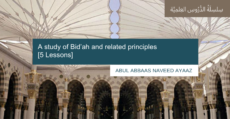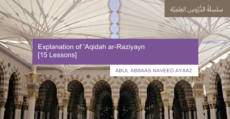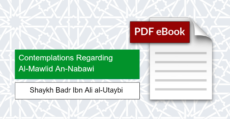In the name of Allāh, ar-Raḥmān (the most merciful), ar-Raḥīm (the bestower of mercy).
All praise belongs to Allāh, and may peace and blessings be upon the best of mankind, our Prophet Muhammad, his family, and his Companions.
Many people celebrate the Mawlid (the supposed birthdate of the Prophet ﷺ), claiming it to be an expression of love for him. As a result, they accuse those who do not celebrate it of hating the Prophet ﷺ. However, there are clear reasons why Ahlus Sunnah do not celebrate the Mawlid:
1. Following the Sunnah of the Prophet ﷺ.
We follow the Prophet ﷺ by performing acts of worship he legislated, and abstaining from those he did not. The Prophet ﷺ never celebrated his own birthday; therefore, celebrating it is a bid’ah (innovation). He said:
And every innovation is misguidance, and all misguidance is in the Fire. [1]
2. Following the Four Rightly Guided Caliphs.
Abū Bakr, ʿUmar, ʿUthmān, and ʿAlī, radiaAllahu ‘anhum, never celebrated the Mawlid. The Prophet ﷺ said:
You are upon my Sunnah and the Sunnah of the Righteous Guided Caliphs.” [2]
3. Following the noble Companions.
Those closest to the Prophet ﷺ, the Companions, never observed the Mawlid. As Allāh warns:
{وَمَن یُشَاقِقِ ٱلرَّسُولَ مِنۢ بَعۡدِ مَا تَبَیَّنَ لَهُ ٱلۡهُدَىٰ وَیَتَّبِعۡ غَیۡرَ سَبِیلِ ٱلۡمُؤۡمِنِینَ نُوَلِّهِۦ مَا تَوَلَّىٰ وَنُصۡلِهِۦ جَهَنَّمَۖ وَسَاۤءَتۡ مَصِیرًا}
{Whoever opposes the Messenger after guidance has become clear to him and follows other than the way of the believers — we will give him what he has taken and drive him into Hell, and evil it is as a destination} [04:115]
4. Following the great scholars of Ahlus Sunnah.
Imām Abū Ḥanīfah, Imām Mālik, Imām al-Shāfiʿī, and Imām Aḥmad ibn Ḥanbal never celebrated the Prophet’s birthday. There is no credible evidence from the Qur’ān, Sunnah, or the scholars of the Ummah to support this practice.
Tāj ad-Dīn al-Mālikī said: “I do not know of any credible proof established from either the Qur’ān or Sunnah regarding the Prophet’s birthday; neither has such an action been narrated from any scholars of the Ummah.” [3]
5. Respecting the early generations.
For over 400 years, the earliest and most pious generations of Muslims did not celebrate the Mawlid. The action of celebrating the Prophet’s birth was innovated after the first three virtuous centuries, not during the era of the righteous predecessors.
6. Historical origins of the Mawlid.
The celebration was first introduced in Cairo by the Fatimid rulers (Bāṭiniyyah Ismāʿīliyyah) during the 4th century (hijri). The first Fatimid ruler to institutionalise it was “al-Muʿizz li-Dīnillāh”. He introduced six festivals: the Prophet’s birthday, the birthdays of ʿAlī ibn Abī Ṭālib, Fāṭimah al-Zahrāʾ, al-Ḥasan, al-Ḥusayn, and the reigning ruler. [4]
7. Every bid’ah is rejected.
Celebrating the Mawlid is an innovation, and every innovation in religion is rejected. The Prophet ﷺ said:
Whoever innovates a matter into this affair of ours, it will be rejected. [5]
8. Avoiding imitation of Christian festivals.
The Christians celebrate Mawlid al-Masīḥ (Christmas). We do not imitate them by innovating Mawlid an-Nabī. The Prophet ﷺ said:
Whoever imitates a people, then he will be amongst them. [6]
9. Following the example of the Prophet ﷺ.
We emulate the Prophet ﷺ in his actions, celebrating only what he celebrated and avoiding what he did not. Allah said,
{لَقَدْ كَانَ لَكُمْ فِي رَسُولِ اللَّهِ أُسْوَةٌ حَسَنَةٌ لِمَن كَانَ يَرْجُو اللَّهَ وَالْيَوْمَ الْآخِرَ وَذَكَرَ اللَّهَ كَثِيرًا}
{Indeed, you have in the Messenger of Allāh an excellent example for anyone who hopes in Allāh and the Last Day and remembers Allāh much} [33:21]
10. True love of the Prophet ﷺ.
True love for the Prophet ﷺ is demonstrated by following his Sunnah, not through innovations or celebrations he never observed.
{قُلْ إِن كُنتُمْ تُحِبُّونَ اللَّهَ فَاتَّبِعُونِي يُحْبِبْكُمُ اللَّهُ وَيَغْفِرْ لَكُمْ ذُنُوبَكُمْ}
{Say: If you truly love Allāh, then follow me; Allāh will also love you and forgive your sins} [03:31]
Written by the one in need of Allāh:
Abul ʿAbbās Naveed Ayaaz
Nelson, Lancashire, UK
4th Rabīʿ al-Awwal 1436h,
Corresponding to 26th December 2014.
Footnotes
[1] Narrated by Jābir Ibn ʿAbdillah; Collected by at=Tirmidhī.
[2] Narrated by ʿIrbād ibn Sāriyah; Collected by Abū Dāwūd & at-Tirmidhī.
[3] Tāj ad-Dīn al-Mālikī, in “Al-Mawrid fī ʿAmal al-Mawlid”.
[4] Muhammad bin Bakhīt al-Mutīʿī in “Aḥsan al-Kalām fī mā yataʿallaq bis-sunnah wal-bidʿah min-al-aḥkām”.
[5] Narrated by ʿĀ’ishah; Collected by Muslim.
[6] Narrated by Ibn ʿUmar; Collected by Abū Dāwūd & Aḥmad.






